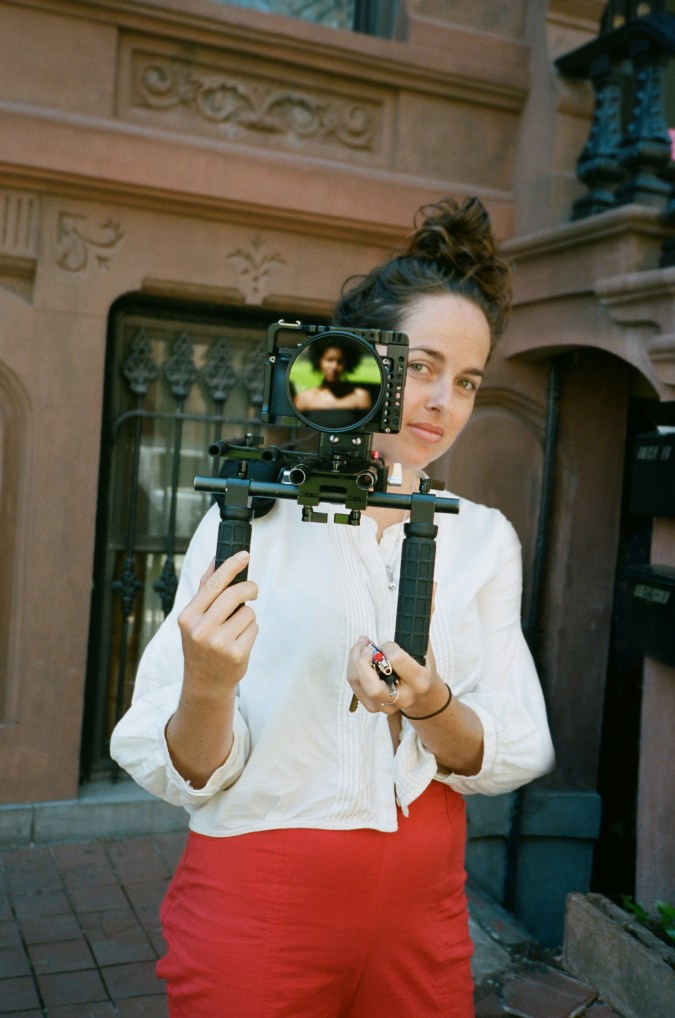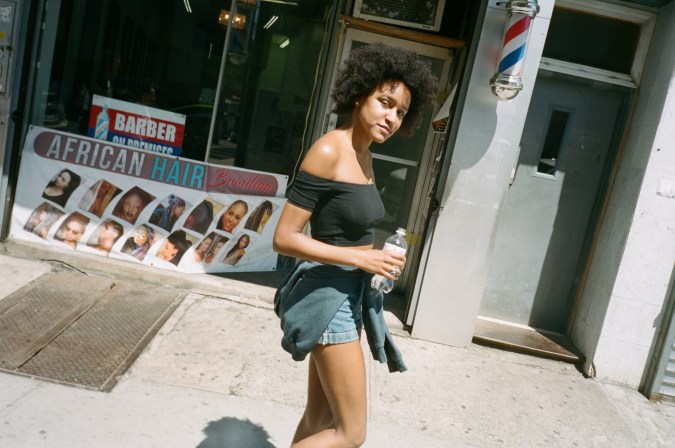Sofia Geld and Rebeca Huntt are filmmakers intent on telling a story seldom seen on the big screen. That story is BEBA, a film that follows activist and New York native Rebeca, an Afro-Latina mining her own history to examine what Afro-Latina womanhood means in the current political climate. A hybrid doc that mixes verité-style filmmaking with animations and interviews of those closest to the director/star, BEBA hopes to offer a complex narrative about intersectional identities and politics. In essence, it’s a narrative about what happens when a black girl is forced to reckon with how others read into her skin color.
The independently produced project has already finished shooting and is currently raising funds to finish post-production. Unafraid to tackle the ways race operates in mostly-white spaces (part of the film is set at a private college), the film looks like a more formally experimental version of Dear White People, with the added distinction that it all is based on Huntt’s own life. Remezcla spoke with the filmmaking duo to talk about how the project first came together, what art inspires them (spoiler: both Knowles sisters came up), and why telling stories about marginalized people is more important than ever.
Read our full chat below and be sure to check out their Kickstarter campaign to support this Afro-Latina story.
How did BEBA begin? Where did the idea come from?
Sofia: You could say it began with our friendship. Almost a decade ago we were freshmen in college and completely fascinated by the different systems of race and class that we came from. We started a conversation that has continued to this very day. Specifically though, it started with the death of Michael Brown. Rebeca and I were caught in a late night conversation about how we could add to the national conversation, and she eventually brought up the idea of making a film. From the moment Rebeca asked, it clicked. I asked her if she would tell her story. I had been working in the field since graduating from college, and Rebeca has been writing since before I can remember. So we pulled our strengths together, and that is where our creative partnership really begins.
Rebeca: We agreed we had to do something, and I thought a film would be the most universal way to bring impact. It’s crazy because at first the film wasn’t going to focus on me, but it just ended up being that way, Sofia kinda convinced me a personal story is the most powerful way to really [make an] impact. From there we just birthed so many ideas and executed them, and it’s been this incredible process, we never looked back.
You write in your Kickstarter that you “made the commitment from the very beginning to bringing together a team that is reflective of the story being told.” Tell me more about why this such a crucial part of projects like these?
Sofia: There are two main reason for this. One: The film was born from the idea that we need to be shining a light on marginalized voices, and these are the ones to tell this this story. And two: This is a deeply personal story, we are looking closely at BEBA‘s friends, and family. The way our DP Michelle, who is also Afro-Latina can pick up on some of the nuances of Rebeca’s upbringing, and the complexities of her character today, is very specific and special. Each person on our teams adds a layer of understanding, and makes this film be from the community and for the community.
“We need diverse story tellers. As a black person why shouldn’t I have the agency and resources to define, empower, and reflect myself and the people I represent?”
Rebeca: It’s a crucial part of the process because the film industry is highly homogenous, and that can’t be the only demographic telling/creating stories that reach such a large scale. We already have seen how it’s (not) been working out. Diversity is crucial, not only within characters, but the points of view. We need diverse story tellers. As a black person why shouldn’t I have the agency and resources to define, empower, and reflect myself and the people I represent? Being reflected is humanizing and empowering, and not something that has been available to black people on the same scale as it has to white people. Even an all-white crew on this film would have made it a different story, it would be a completely different project, catering to the white gaze, even if subconsciously – and to me that’s not a story about a black girl, that’s a story about a white person’s interpretation of a black girl. Which is fine, but not when it’s all we have and have had. I think the world is where it’s at in a lot of ways because of this lack of diversity in story telling/history up until now, because white people have created this hegemonic global narrative that takes away from the humanity, complexity, and reality of the lives of people of color.

I wanted to hear more about the choice to shoot it as a hybrid-doc, and maybe hear about what, if any, films or projects you guys are using as an inspiration, or as a guide.
We want our audience to really understand, and feel the psychological minefield a woman of color must traverse as she comes of age in this tumultuous time.
Sofia: We are working to make the film emotionally honest, and felt like the bonds of traditional documentary film would hold us back from packing an authentic punch. We decided the best way to illustrate the day to day emotional impact of racist micro-aggressions would be through poetry and animation, rather than through interviews. We want our audience to really understand, and feel the psychological minefield a woman of color must traverse as she comes of age in this tumultuous time. For this to be at all possible, we must be flexible with our visual language. We have many mentors and sources of inspiration, but I would say the two works we look to the most are Terence Nance’s The Over Simplification of her Beauty, and Petra Costa’s ELENA. Though both films are completely different in terms of theme and texture, they are deeply personal work that blur the lines of fiction and reality in intentional and powerful ways.
Rebeca: We chose to make a hybrid-documentary because we felt that real life is important and impactful. We are both artists who love the idea of using different forms of art to tell a story within film, and I feel like there’s so many dimensions to the way I view the world, and aspects of my experiences that would be better explained in reenactments, or animation, or poetry rather than an interview. I think Terence Nance’s An Oversimplification Of Her Beauty is a huge inspiration for this film, he uses animation, creative writing, and reenactment to tell a love story about this really regular black couple in their creative young adulthood, the story is so deep, yet so simple, and humanizing, you know? Most of the time for a black person to have a movie made about them they have to be the globally acclaimed GOAT, yet white people have an endless array of unexceptional coming of age stories, movies, historical references etc., and these narratives are important and empowering. We are also inspired by the art around us, from Hector Babenco’s Pixote, to Queen Bey’s Lemonade, to Kendrick Lamar’s DAMN, to Solange’s existence. Being alive is the biggest inspiration, really. Sofia and I enjoy being alive very much.

What does it mean to be telling this kind of intersectional story in 2017? What might it add to current debates on race relations in the US?
“Trump is president and shit is hitting the fan, and I think it’s important that as black people, we see ourselves humanized”
Sofia: BEBA is an attempt to complicate the framing of race relations today. Our story follows a young Afro-Latina from a low-income neighborhood. Throughout her life, she has struggled to fit squarely into any one community and learns to build a nuanced understanding of the many ways one can be a woman of color in America. Her story offers an alternative narrative of racial identity. Since the death of Michael Brown, and the start of this film, black death has been widely reported in the media. It is hard to escape it on the news/social media feeds. While it is important to recognize the severity of the crisis we are faced with, it is also critical that we tell stories celebrating the beauty and complexity of black life. Our story is a rare and intimate view into the life of a black woman, struggling to combat the trauma of racism in America, and commit to self-love. At its core BEBA truly a celebration, a love letter to black life.
Rebeca: 2017 is a time when white people’s active participation against racism—and other forms of oppression innate in white supremacy—is vital to the direction this country and this world will take. It’s also a time when black people, the black youth who have studied/are a product of the civil rights movement, have come together to fight for their agency and their lives through grassroots movements and relentless creativity, in a time where we are more connected globally than ever through social media. Trump is president and shit is hitting the fan, and I think it’s important that as black people, we see ourselves humanized, when our bodies are dehumanized or politicized so blatantly for the whole world to see. It’s taking back our power and agency. I think it adds a complex story and very personal story, and in its telling it is illustrating that black lives are complex and incredible and hard and beautiful and diverse, and they matter! Our experiences matter.
Could you talk about the choice to go the crowdfunding route?
Sofia: As independent filmmakers we are constantly working to make our films a reality. As emerging female filmmakers making a hybrid-documentary it has been hard to find funding through the traditional sources, and so we have turned to our community to help us make this project a reality. It truly is a family effort in every sense. We are raising funds specifically to bring on artists and musicians who are culturally aligned with the film. The campaign will end with a blow out fundraising party on June 1st, check out our Facebook and Kickstarter pages for details, and we hope to see everyone there!
Rebeca: I think it was both out of necessity and choice, honestly. A lot of classic grant organizations didn’t really, don’t, quite understand what we are doing because it’s new, and it’s specifically coming out of our very current time. And what people don’t know makes them uncomfortable, and less likely to back up. However, it’s also given us an incredible freedom. Ultimately, this film is being made for the people, by the people, and through crowd-funding everyone who wants to has a chance to take part of making this happen. Speaking of crowd funding we are having a LOCO LIT party at Mr. Wu’s Basement on Thursday, June 1st and you can purchase tickets on our Kickstarter.




